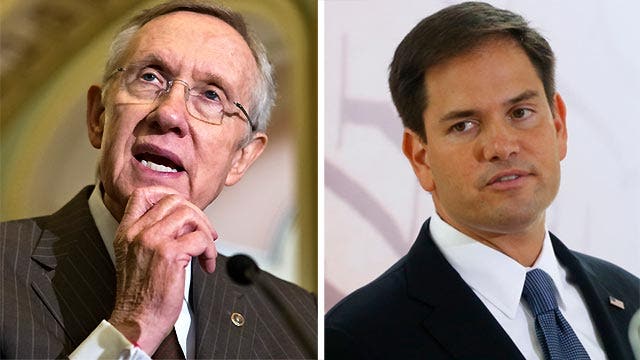Power Play 6/20/2013
GOP Caught in Reid's immigration squeeze play, Obama continues to push his environmental agenda and West Virginia's Big 150
“This is a crock that is being sold to Republican politicians, that they can just buy off Hispanics. And frankly, it's offensive. But it's being sold as pure politics.”
-- Sen. Ted Cruz on “The Rush Limbaugh Show,” voicing his opposition to immigration legislation in the Senate.
Moderate Republicans are today trying to stage a dramatic rescue effort for a massive immigration package that has come under withering fire from conservatives in the party.
The challenge is heightened as liberal Democrats dig in on their demand for permanent residency for millions of illegal immigrants without preconditions.
And the pressure couldn’t be higher as Senate Majority Leader Harry Reid tells the GOP that it’s now or never. Reid is threatening to start moving toward a vote on Friday, leaving moderate Republicans in a desperate scramble to come up with an amendment that will satisfy conservative concerns and allow the bill to clear a 60-vote hurdle to move on to a final vote.
Democrats care much less than Republicans about whether this iteration of immigration legislation passes or fails. Democrats believe that demography and the prevailing political winds mean that subsequent legislation will be more liberal as a rising tide of Hispanic voters expands Democratic majorities. Having Republicans scotch proposed legalization now, Democrats believe, is a substantial political win for the Blue Team.
The Democratic base believes that the longer Republicans block legalization, the sweeter and more complete the eventual victory will be.
Republicans who share this perspective are currently in a vice grip of Reid’s creation. If they don’t move a bill now, they fear being pilloried by Democrats and the establishment press for being racists and xenophobes. If they do move a bill now, they fear a conservative backlash so harsh that it could mean a wipeout for moderates in next year’s primaries and into the primaries of 2016.
This backlash, say many Republican strategists, could accelerate the party’s decline by leaving the GOP beholden to a shrinking base of older, white voters and out of step with younger voters and the growing portion of non-white Americans.
The problem now is the same as it was in 2007 and every other time the topic has been discussed since the mid-1980’s: conservatives do not trust promises of increased border security.
As for the warnings of demographic doom, conservatives argue that rapid legalization and citizenship would not only fracture the party’s base in future elections but hand Democrats a major advantage by expanding the pool of eligible recent Hispanic immigrants, who overwhelmingly favor the majority party.
Today’s rescue effort centers on a deal for more immediate efforts on border security: additional fencing on the Mexican border and doubling the border guard. The deal was crafted in negotiations between the “Gang of Eight,” the bipartisan tribe that created the original legislation, and two moderate Republicans, Sens. John Hoeven of North Dakota and Bob Corker of Tennessee.
This sets up a battle between two of the party’s brightest stars of the moment, Sen. Ted Cruz, a freshman from Texas, and Marco Rubio, a freshman from Florida.
Both are Cuban-Americans and both won acclaim from conservatives by winning upset Senate primary bids against moderate, establishment-backed candidates, Cruz in 2012 and Rubio in 2010.
Conservatives do not trust promises of increased border security.
Rubio, who despite multiple overtures to conservatives, now finds himself the target of outrage on the right and has said he may not support the legislation he helped draft without additional security measures. The Hill reports today that Rubio did not participate in the negotiations on the Hoeven-Corker deal. But on “Hannity with Sean Hannity” Wednesday night, Rubio spoke favorably about a possible deal today on the plan.
Cruz, meanwhile, is escalating his attacks on the plan. His fellow conservative, Sen. Rand Paul, R-Ky., has continued to offer to be a conduit between Senate moderates and conservatives in the House to try to salvage a plan, but Cruz slammed on the brakes Thursday.
In an interview with Rush Limbaugh, Cruz attacked the legislation as another version of the much-lambasted 1986 immigration law that delivered an amnesty for illegal immigrants but never produced promised enforcement mechanisms.
Will the Corker-Hoeven amendment be enough to quell those concerns, or are we seeing a replay of the gun-control effort earlier this year in which a last-ditch effort by moderates on an amendment fails to convince conservatives and sends the underlying package down to defeat?
While Reid’s motivations for his immigration squeeze play are different than they were when he forced the issue on firearms -- then he aimed to spare Democrats difficult votes -- now he aims to inflict maximal pain on Republicans. The outcome could be the same.
The promise from moderates that whatever emerges from the Senate would be tempered by the Republican House is only a partial salve. Senate Republicans on the fence also know that the House might opt to kill the legislation outright, leaving their Senate colleagues high and dry. It’s one thing to vote for a Senate compromise in a bid to make yet another deal later on, but quite another to cast a risky vote for naught.
Reid may have Rubio over a barrel or Rubio may yet find a way to rescue the legislation he says is key to his party’s future viability. Today’s Senate struggle will tell the tale.
And Now, A Word From Charles
“The president is continually amazing. Of all the issues on earth… what is the least important issue on the planet? Nuclear arms reduction.”
-- Charles Krauthammer on “Special Report with Bret Baier.”
Hail, West Virginia!
“We can scarcely dispense with the aid of West-Virginia in this struggle; much less can we afford to have her against us, in congress and in the field. Her brave and good men regard her admission into the Union as a matter of life and death. They have been true to the Union under very severe trials. We have so acted as to justify their hopes; and we can not fully retain their confidence, and co-operation, if we seem to break faith with them.”
-- Abraham Lincoln on the topic of statehood for West Virginia in his annual message to Congress, submitted December 3, 1861. West Virginia became the 35th state on June 20, 1863. Happy sesquicentennial, Mountain State.
Chris Stirewalt is digital politics editor for Fox News, and his POWER PLAY column appears Monday-Friday on FoxNews.com. Catch Chris Live online daily at 11:30amET at http:live.foxnews.com.





